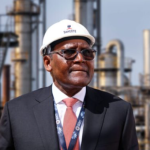The President of the ECOWAS Commission, Dr. Omar Alieu Touray, has described the Dangote Petroleum Refinery as a monumental symbol of Africa’s industrial ambition and self-reliance.
Speaking during a high-level delegation visit to the 650,000 barrels-per-day facility in Lagos, Touray praised the refinery as a transformative project for the continent.
“What I have seen today gives me a lot of hope, and everybody who doesn’t believe in Africa should come here. Visiting here will give you more hope because this is exactly what our continent should focus on,” Touray said. “We have seen something I couldn’t have imagined, and really the capacity in all areas is impressive. We congratulate Alhaji Dangote for this trust in Africa because I think you do this only when you have the trust, and he has a vision for Africa, and this is what we should all work to encourage.”
The ECOWAS delegation included key officials such as Commissioner for Infrastructure, Energy and Digitalisation Sediko Douka; Commissioner of Internal Services Prof. Nazifi Abdullahi Darma; Director of Private Sector/SME Dr. Tony Luka Elumelu; and Touray’s Chief of Staff Abdou Kolley.
Touray emphasized that the refinery’s production of Euro V standard fuel would help ECOWAS member states meet their 50ppm sulphur limit for petroleum products—a standard often unmet by imported fuels, which pose health and environmental risks.
“We are still importing products below our standard when a regional company such as Dangote can meet and exceed these requirements. The private sector must take the lead in ECOWAS industrialisation,” he stated.
Calling for stronger collaboration between governments and businesses, Touray stressed the need for policies that reflect the realities of African industrialists.
“We cannot continue to make decisions on behalf of the private sector from a distance. Visits like this provide us with first-hand experience and direct insight into the challenges they face—challenges that authorities and government officials must work to address,” he said.
As ECOWAS marks its 50th anniversary, Touray reaffirmed the bloc’s commitment to engaging the private sector in shaping industrial strategies to tackle unemployment, poverty, and insecurity.
“Only the private sector can deliver the scale of impact required, and it is essential that we listen to them, understand how these objectives can be met, and identify the bottlenecks they face so that they can be effectively addressed,” he added.
President of Dangote Group, Aliko Dangote, who led the delegation on a facility tour, reiterated that Africa’s reliance on imports stifles development.
“As long as we continue importing what we can produce, we will remain underdeveloped. This refinery is proof that we can build for ourselves at scale, to global standards,” he said.
Dangote dismissed claims that the refinery cannot meet regional demand, stating, “There have been many claims suggesting that we don’t even produce enough to meet Nigeria’s needs, so how could we possibly supply other West African countries? But now, they are here to see the reality for themselves.”
Highlighting the refinery’s economic impact, Dangote noted that diesel prices dropped from N1,700 to N1,100 per litre after production began, with further reductions benefiting industries, mining, and agriculture. He also revealed that Nigerians pay significantly less for petrol compared to neighbouring countries.
“In neighbouring countries, the average price of petrol is around $1 per litre (N1,600), but here we’re selling at N815–N820. Many Nigerians don’t realise they’re paying just 55 per cent of what others in the region pay,” he said.
Dangote hinted at upcoming expansions, assuring Nigerians that the refinery was built for their benefit. The ECOWAS delegation pledged support to help Dangote Group access wider regional markets and urged other African nations to emulate Nigeria’s industrial vision.







